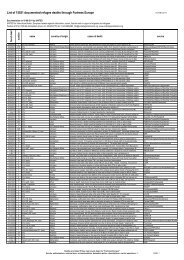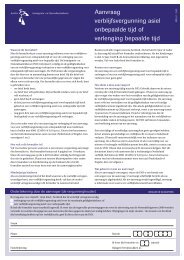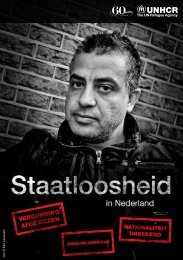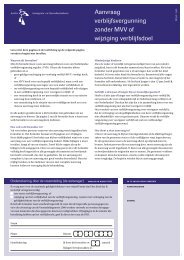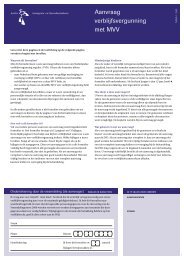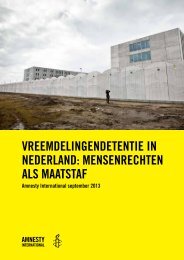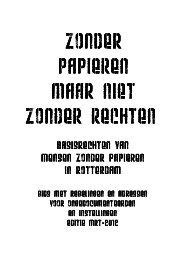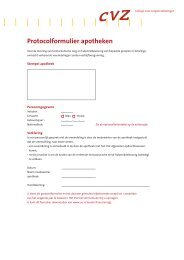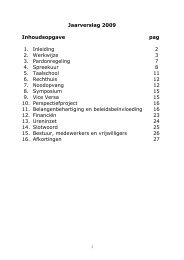Handboek voor begeleiders van vluchtelingen en ... - Stichting ROS
Handboek voor begeleiders van vluchtelingen en ... - Stichting ROS
Handboek voor begeleiders van vluchtelingen en ... - Stichting ROS
Create successful ePaper yourself
Turn your PDF publications into a flip-book with our unique Google optimized e-Paper software.
APPENDIX A<br />
International Legal Framework Governing Det<strong>en</strong>tion of Refugees,<br />
Asylum Seekers and Migrants<br />
Below is a description of the international treaties, guidelines, resolutions and principles<br />
rele<strong>van</strong>t to administrative det<strong>en</strong>tion.<br />
• Universal Declaration of Human Rights 1948 (UDHR): Article 3 of the UDHR<br />
provides that everyone has the right to liberty. Additionally, article 13 states that<br />
every person has the right to freedom of movem<strong>en</strong>t and resid<strong>en</strong>ce within the borders<br />
of each state, including the right to leave any country and to return. Article 14 of the<br />
UDHR provides that every person has the right to seek and <strong>en</strong>joy asylum from<br />
persecution.<br />
• 1951 Conv<strong>en</strong>tion relating to the Status of Refugees (the G<strong>en</strong>eva Conv<strong>en</strong>tion):<br />
The G<strong>en</strong>eva Conv<strong>en</strong>tion is the primary docum<strong>en</strong>t addressing the issue of refugee<br />
protection, establishing the definition of refugee, the rights of refugees and the<br />
obligations of States to provide protection. Article 26 requires states to permit<br />
freedom of movem<strong>en</strong>t for refugees and asylum seekers who are lawfully in the<br />
territory. Persons with asylum applications p<strong>en</strong>ding should be considered to be<br />
lawfully in the territory and, therefore, should not be detained. Article 31(1) advises<br />
states that they should not p<strong>en</strong>alize refugees or asylum seekers on account of illegal<br />
<strong>en</strong>try or pres<strong>en</strong>ce in the host country. Article 31(2) urges governm<strong>en</strong>ts to restrict<br />
freedom of movem<strong>en</strong>t only wh<strong>en</strong> necessary. The drafters of the G<strong>en</strong>eva Conv<strong>en</strong>tion<br />
understood that det<strong>en</strong>tion could be necessary under certain circumstances. Therefore,<br />
under Article 9, governm<strong>en</strong>ts are permitted to take provisional measures in times of<br />
war or other exceptional or grave circumstances and necessary to national security.<br />
Such provisional measures include det<strong>en</strong>tion.<br />
• International Cov<strong>en</strong>ant on Civil and Political Rights (ICCPR): The ICCPR<br />
establishes the basic civil and politic rights of individuals. Articles rele<strong>van</strong>t to<br />
det<strong>en</strong>tion include the following: 1) Article 2 requires State Parties to <strong>en</strong>sure to all<br />
individuals within its territories that the rights delineated in the cov<strong>en</strong>ant be respected;<br />
2) Article 7 contains the prohibition against torture or cruel, inhuman or degrading<br />
treatm<strong>en</strong>t; 3) Article 9 guarantees the right of liberty and security of persons to all; 4)<br />
Article 10 provides that all persons detained shall be treated with humanity and<br />
dignity; 5) Article 12 establishes that all persons within a state’s territory be<br />
guaranteed freedom of movem<strong>en</strong>t and freedom to choose resid<strong>en</strong>ce; 6) Article 13<br />
establishes due process in expulsion procedures; and, 7) Article 40 requires State<br />
Parties to submit reports relating to their compliance with the treaty. Article 1 of the<br />
Optional Protocol to the ICCPR provides for an individual complaint mechanism for<br />
persons alleging violations of the Conv<strong>en</strong>tion.<br />
• International Cov<strong>en</strong>ant on Economic, Social and Cultural Rights (ICESCR):<br />
Article 3 of the ICESCR obliges State Parties to <strong>en</strong>sure the equal rights of m<strong>en</strong> and<br />
wom<strong>en</strong> in the <strong>en</strong>joym<strong>en</strong>t of all economic, social and cultural rights as set forth in the<br />
treaty. This provision makes no distinction betwe<strong>en</strong> nationals of States Parties and<br />
foreigners residing therein.<br />
64




